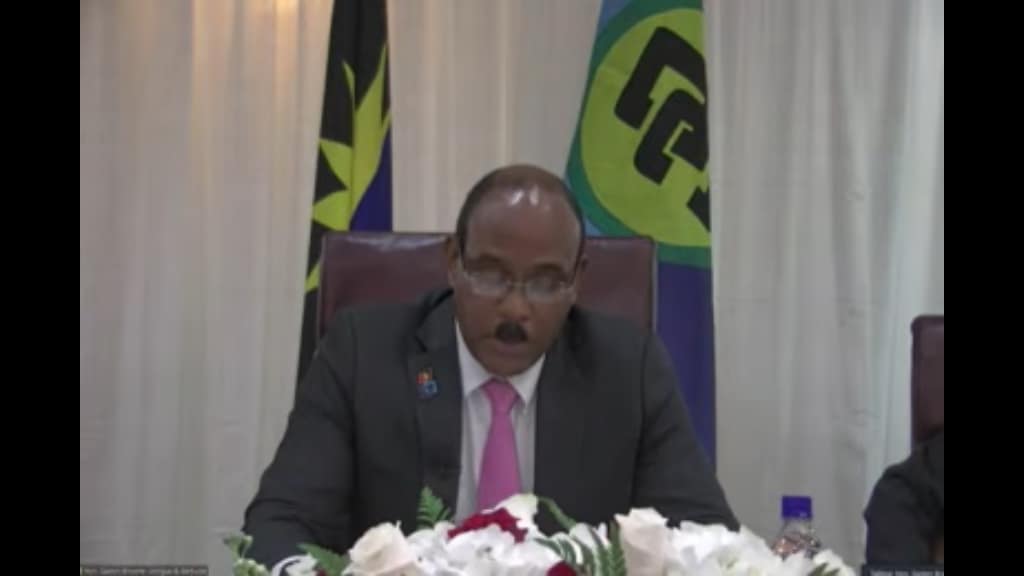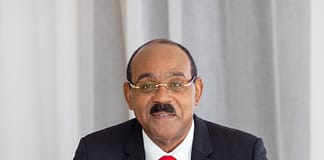
Caribbean Community (CARICOM) leaders began their annual summit here on Monday in the shadows of a global health pandemic that has crippled their local economies, the impact of climate change, new global tax impediments as well as the need to push forward with initiatives aimed at deepening the regional integration movement.
The two-day virtual meeting is the last for outgoing CARICOM Secretary General, Irwin La Rocque, who acknowledged that during his 10 year tenure “much more could have been done” to strengthen the 15-member regional grouping.
“I am the first to recognise that more could have been accomplished, particularly with the CSME,” he said.
Antigua and Barbuda’s Prime Minister, Gaston Browne, who will chair CARICOM for the next six months, urged his regional colleagues not to “kick the cant down the road’ as it relates to taking positions regarding the implementation of initiatives to strengthen the integration process.
“Lets us cease and desists from the developmental mal-practice of kicking the can down the road, but instead, work assiduously to resolve the issues affecting our region, in accelerating the advancement of our region and its people,” Browne said.
“There are almost two dozen items on our agenda for this meeting, and I urge all of us to approach them with a sense of urgency and decisiveness,” he added.
Among the agenda items are advancing of the CARICOM agri-food systems agenda, the development of a joint tourism policy, the issue of the political situation in Haiti, crime and security, tax transparency, blacklisting and de-risking, and the adequacy of the Caribbean Court of Justice Trust Fund.
Browne told his regional colleagues as well as other stakeholders attending the opening ceremony that their gathering was taking place against a backdrop of economic, social, financial and environmental storms more intense than the hurricanes that swirl around the region every year during the season.
“And, like the hurricanes and storms, the economic and social turmoil engendered by Covid-19 and its effects threaten our very survival,” he said, noting that some member countries, most notably St Lucia and Barbados, were recovering from the passage of Hurricane Elsa through the Lesser Antilles this past weekend.
He said the recent volcanic eruption in St Vincent and the Grenadines and devastating floods in Guyana and Suriname, which displaced thousands of people and destroyed significant agricultural production, provide further evidence of the ongoing challenges that beset regional countries.
But Browne said that while the climatic events serve to underscore the vulnerability of the region, the Caribbean is on its own battling to stem the economic and social tidal wave of the coronavirus (COVID-19) pandemic.
“Unlike the rest of the world, we are battling the pandemic at the beginning of an Atlantic hurricane season, that has already seen five storms within the first month, and which is forecasted to be one of the busiest in recent years.
“The causes of the climate crisis have already been scientifically established, and the time has come for those countries irresponsible enough to continue their damaging emissions and practices to be held to account.
“It is my view that real progress on the climate crisis will only be made when the major polluters are made legally liable for the damage they cause. The current system of discretionary international assistance for climate damage, where pledges are honoured only fitfully, is both inadequate and inequitable,” Browne said, adding “this is a call for climate reparations that CARICOM must take up urgently, and engage in vigorous diplomatic outreach to build international consensus on this issue”.
The Antigua and Barbuda leader said that the events of the last 16 months have underscored the importance of establishing several regional institutions such as the Trinidad-based Caribbean Public Health Agency (CARPHA).
But he said that COVID-19 has shaken “our economic foundations and the recovery will test the strength of our will, to work together to prevent economic collapse.
“The collective approach that served us so well in managing the outbreak of the pandemic in our region must be translated to the economic sphere, so that we will not only survive this test, but thrive and emerge stronger,” he said, adding that a crucial weapon in this battle is the vaccination of the population in the region until herd immunity is achieved.
Browne said that while he wanted to thank countries that have so “generously” donated vaccines to the Caribbean “the other side of the equation is to ensure that a sufficient number of our citizens are inoculated so that our countries could gain herd immunity.
“I urge those who are reluctant to take the jab to think again. I appeal to your better nature and your appreciation of the well-being of yourself, your family and your fellow citizens. No one is safe until everyone is safe.”
Browne said he was urging regional leaders during their meeting to seriously discuss “this important question of vaccine hesitancy in the region, and to devise joint strategies in tackling it head-on.
“It is vitally important for our economies to breathe again, for jobs to be retained, for our children to resume their education and for something resembling a normal life to begin to return to our businesses, our hotels, our schools, our farms and all aspects of our lives,” Browne said, adding that for tourism-based economies, the resumption of intra-regional travel is one key element in getting economic activity back to normal.
He said increased movement of people within the Caribbean would be a major boost to regional economies in seeking to rebound.
“To assist in this regard, we need to immediately establish common or harmonized regional health protocols for travel (‘travel bubble’) that are clear to the public and communicated widely. The discriminatory practice of banning travel from member states with elevated levels of COVID, while accommodating guests from countries of greater risks should be discouraged.
“It is not an exaggeration to say that air transport is the oxygen that keeps tourism alive and functioning in our region. We need to care for it and provide the inputs and the enabling economic environment that will allow air transportation to grow our tourism sector back to good health.”
In his address, the new CARICOM chairman said that the region must continue to deal with the inequality shown by the developed countries regarding taxes and labelling the Caribbean as tax havens.
“We are all already familiar with the brazen attacks on one of our major efforts at economic diversification, through the misguided tool of blacklisting. Our financial services sector has been targeted repeatedly, despite our adherence to the myriad ever changing rules and regulations put forward by the OECD (Organisation for Economic Co-operation and Development) and FATF (Financial Action Task Force) and other relevant global authorities.
“We object to being targeted and placed on lists of so-called ‘non-cooperative jurisdictions’ by countries that claim to be in an economic partnership with us,” Browne said, adding that the economic partnership (EPA) which Caribbean countries have signed with the European Union “has failed to deliver the promised developmental benefits to all of its members.
“The EPA has failed to deliver its promised benefits to all its members. We object to the lack of consultation, and to the lack of real understanding or empathy regarding the impact of these policies on small and vulnerable economies,” Browne said, adding that the latest measure being adopted is the global minimum corporate tax initiative.
“A global minimum corporate tax rate would remove our flexibility as sovereign nations to adopt tax policies that best suit our circumstances. Small and micro-states must be able to use taxation policies as legitimate instruments to better compensate for small market size, remote location, lack of resources, and industrial disadvantage.
“We refuse to accept being condemned to uncompetitiveness and underdevelopment. We are determined to achieve the sustainable goals for our people. While we acknowledge that the global tax system is in need of renovation, we emphasize that CARICOM states are not the problem. We should not be collateral damage on the road to a fairer international tax regime.”
Browne warned Caribbean leaders of throwing “up our hands in despair,” adding “we must continue to collectively fight these inequalities.
“This is another opportunity for us to act in concert and join with other affected small and micro-states to advocate for a carve-out. We must continually monitor the emerging threats in this sector, whether from the OECD, the EU or any other source.”
Browne said that these realities should encourage the region to move more urgently with the implementation of the CARICOM Single Market and Economy (CSME that allows for the free movement of goods, skills, labour and services across the region.
“We can no longer afford the luxury of delaying approval of key instruments such as the Financial Services Agreement, Investment Policy and Incentive Regimes and the Development and Regulation of a Regional Securities Market. The full operationalization of the CSME is required for the transformation of our economies and to fight for a robust post COVID recovery. “
He said moving the regional economies forward would also be dependent on the widespread enhancement of the Information and Communication Technology (ICT) infrastructure.
“The cost of telecommunications and access to cheaper and more efficient broadband is a sine qua non for our economic development. The provision of affordable broadband is a public good, as vital as the provision of water or electricity,” Browne said, adding that he was encouraged by the recent reports of negotiations to reduce roaming charges in the Region.
“It is a first step, but a very important one, leading I hope to more progress towards establishing the Single ICT space. The economic potential that lies within that initiative is limitless,” he told his regional colleagues.
Advertise with the mоѕt vіѕіtеd nеwѕ ѕіtе іn Antigua!
We offer fully customizable and flexible digital marketing packages.
Contact us at [email protected]
















